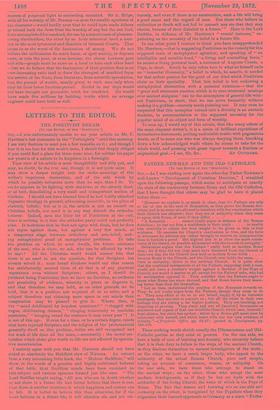LETTERS TO THE EDITOR.
THE POSITIVIST DREAM.
[To THE EDITOR. OF THE "SPECTATOR,")
was unfortunately unable to see your article on Mr. F. Harrison's last statement in the " Fortnightly" until this morning. I am very desirous to send you a few remarks on it ; and though I fear it is too late for this week's issue, I should feel deeply obliged if you could find a place for them some time, for neither his paper nor yours is of a nature to be forgotten in a fortnight.
Your view of his article is most thoughtfully and ably put, and may, no doubt, be the true one, though it is not quite mine. It may show a deeper insight into the under-meanings of this writer's impetuous declaration, and of the aide winds by which he possibly intimates more than he says, than I do. To me he appears to be fighting with shadows, or the already dead, or at best, demolishing a very small and unimportant section of thinkers. I should not have blamed him if he had boldly attacked dogmatic theology in general, advocating scientific, in the place of abstract, beliefs ; but as it is, the article is not an assault on Christian beliefs, nor need it in any way disturb the orthodox believer. Indeed, save the little bit of Positivism at the end, there is nothing in it that the orthodox party could not perfectly echo. It is obvious that he does not agree with them, but he does not argue against them, but against a very few minds, at a temporary stage between orthodoxy and non-belief, seek- ing metaphysical proof of metaphysical problems. To take the problem on which he most dwella, the future existence of the soul, who is there, we ask, who can be affected by what he says ? All the Christian world would answer him that there is no need to ask the question, for that Scripture has already solved it ; most broad thinkers would say that reason has satisfactorily assured them of all that is of any practical mportance even without Scripture ; others, as I should do (without being Positivists) that we have no faculties, no evidence nor possibility of evidence, whereby to prove or disprove it, and that therefore we may hold, as on other grounds we do hold, that it is a problem not required of us to solve, and a subject therefore not claiming more space in our minds than imagination may be pleased to give it. Where, then, is the "mind debilitated by hopeless questions ? " "clogged with vague, debilitating dreams," "clinging tenaciously to insoluble mysteries," "hanging round the entrance it may never pass " ? It is not of this age. If even for a time, or to a certain degree, minds that have rejected Scripture and the religion of the preternatural generally dwell on this problem, duties are still recognised and the work of life done all the same,—necessarily ; the moral cer- tainties which alone give worth to life are not affected by specula- tive uncertainties.
I entirely agree with you that Mr. Harrison should not have stated so absolutely the Buddhist view of Nirvana. An extract from a very interesting little book, tho "Modern Buddhist," will show, in the words of a genuine and highly-cultivated believer of that faith, that Buddhist minds have been exercised on this subject and various opinions formed just like ours. "The Lord Buddha taught saying, All you who are in doubt whether or not there is a future life had better believe that there is one, that there is another existence in which happiness and misery can be felt. It is better to believe this than otherwise, for if the heart believes in a future life, it will abandon sin and act vir- tuously, and even if there is no resurrection, such a life will bring a good name and the regard of men. But those who believe in extinction or death will not fail to commit any sin that they may choose, because of their disbelief in a future.'" Here is the Lord Buddha, in defiance of Mr. Harrison's "crucial instance," ex- patiating on the necessity of the belief in a future life.
In one other point I venture to think you have misapprehended Mr. Harrison,—that in suggesting Positivism as the remedy for this supposed state of metaphysical agitation, and speaking of "an intelligible and sensible head," "a living and controlling force," he means a living personal head, a successor of Auguste Comte, a Pope, in short. Surely he only refers here to what he himself calls an "immortal Humanity," a belief in which, he asserts, is needed for that ardent passion for the good of our kind which Positivists claim as their speciality. That this belief is but endowing a metaphysical abstraction with a personal existence — that the "great and strenuous emotion which is to cure irrational musings over ancient znigmas " can be the atmosphere of general life with- out Positivism, in short, that we can serve humanity without making it a goddess—scarcely needs pointing out. It may even be suspected that this metaphor turned into a divinity is an exoteric doctrine, in accommodation to the supposed necessity for the popular mind of an object and form of worship.
To sum up, I would say of this article, that like many others of the same eloquent writer's, it is a series of brilliant repetitions of inconclusive statements, putting undeniable truths with pugnacious wrath, as if to some one who was always denying them, knocking down a few acknowledged waifs whom he seems to take for the whole world, and pressing with great vigour towards a fruitless or
unpractical goal.—I am, Sir, &C., AN OUTSIDER.


































 Previous page
Previous page